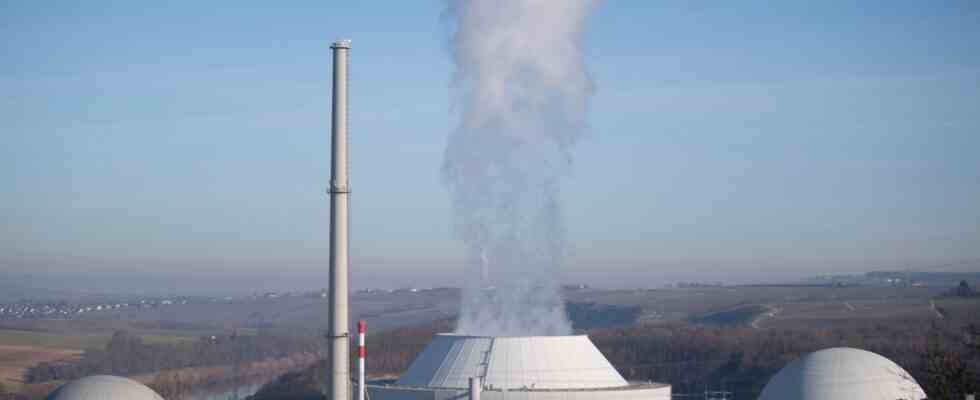As of: 07/25/2022 5:26 p.m
In view of the energy crisis, the debate about longer nuclear power plant runtimes does not stop. According to the government, a quick decision is not to be expected – Chancellor Scholz wants to wait for the results of a second stress test.
In the debate about longer lifetimes for nuclear power plants, the federal government does not want to be pressured into making a decision. Chancellor Olaf Scholz (SPD) initially wants to wait for the results of a second stress test on the security of the power supply, said a government spokeswoman. She confirmed that the question of continued operation of the three remaining nuclear power plants in Germany beyond the end of the year would be examined with an open mind.
A spokesman for Environment Minister Steffi Lemke (Greens) said: “At the moment we are assuming that Germany will phase out nuclear power.” The requirements for continued operation would be very high, security issues would be crucial.
Results expected “in the next few weeks”.
A week ago, the Ministry of Economics announced a second stress test on the security of the electricity supply in Germany. The point is to determine whether the security of supply in the electricity sector and the safe operation of the grid are guaranteed under more stringent assumptions.
A spokeswoman confirmed that results can be expected “in the next few weeks”. She could not give an exact date. Everyone is aware, however, that there is time pressure “and that high pressure must be expected”.
The spokeswoman again pointed out that due to the throttling of Russian deliveries, Germany primarily has a gas and not an electricity problem. Nor is it about allowing German nuclear power plants to run longer in order to replace “broken” French nuclear power plants. A first stress test from March to May of this year came to the conclusion that security of supply is guaranteed for the coming winter.
Göring-Eckardt does not rule out stretching operations
Bundestag Vice President Katrin Göring-Eckardt (Greens) apparently does not rule out the so-called stretching operation of nuclear power plants in Germany beyond the end of the year. When asked whether the Greens would allow such an operation, she said on Sunday evening on the ARD program “Anne Will”: “If it happens that we have a real emergency situation that hospitals can no longer work, if such a If there is an emergency situation, then we have to talk about what about the fuel rods.” However, further measures should be checked before such a “stretching operation”.
The Left Party, however, rejected this. The “stretching operation” is “not sensible” and for safety reasons “not responsible”, said federal managing director Tobias Bank. He criticized the fact that the Greens had even agreed to the re-examination of the possible continued operation of the nuclear power plant.
According to current law, the three remaining nuclear power plants Neckarwestheim 2, Emsland and Isar 2 must be shut down by December 31 at the latest. In the current year, they have a share of around six percent in net electricity generation in Germany.
“Stretched operation” is not considered easy: the Federal Ministries for the Environment and Economics came to the conclusion in an examination in March that the three reactors with the existing fuel rods could only continue to run after December 31 if their power generation was throttled beforehand. The ministries had advised against continued operation. According to the Society for Plant and Reactor Safety (GRS), a stretching operation for at least 80 days would be feasible.
Also worried about PSR exams
Union and FDP are campaigning to suspend the exit plan for the piles and to allow at least limited continued operation beyond the turn of the year. The reactors should therefore continue to generate electricity and thus save gas that is used to generate electricity. The first parliamentary director of the Union faction in the Bundestag, Thorsten Frei (CDU), told the “Bild” newspaper that things had to be done quickly now. Federal Minister of Economics Robert Habeck must do everything possible to close the energy gap next winter. In addition to saving energy, this included raising the cap on energy production from biogas and longer battery life.
The vice chairman of the SPD parliamentary group, Matthias Miersch, is still skeptical about continued operation. “So far, the technical, financial and safety-related aspects speak clearly against any further operation of German nuclear power plants,” he told the newspapers of the Funke media group. “Nuclear power is a high-risk technology with incredible dangers for people and the environment.” The safety checks of the remaining nuclear reactors were 13 years ago, and that too had to be taken into account.
According to the Ministry of the Environment, the periodic safety reviews (PSÜ) serve to thoroughly check a nuclear power plant in addition to ongoing checks. According to the Atomic Energy Act, the PSRs actually have to be carried out every ten years. The last time such a check was carried out for the remaining three nuclear power plants was in 2009. The last one could have been waived – if the nuclear power plant operator had declared in a binding manner that power operation would finally cease no later than three years after the time prescribed for the last PSR.
The economic policy spokesman for the AfD parliamentary group, Leif-Erik Holm, called on the Greens to take off their “ideological blinkers”. “We need all the nuclear power we can get.” In addition to the continued operation of the three power plants that are still in operation, this includes using the three nuclear power plants that were taken off the grid last year to produce electricity again.

